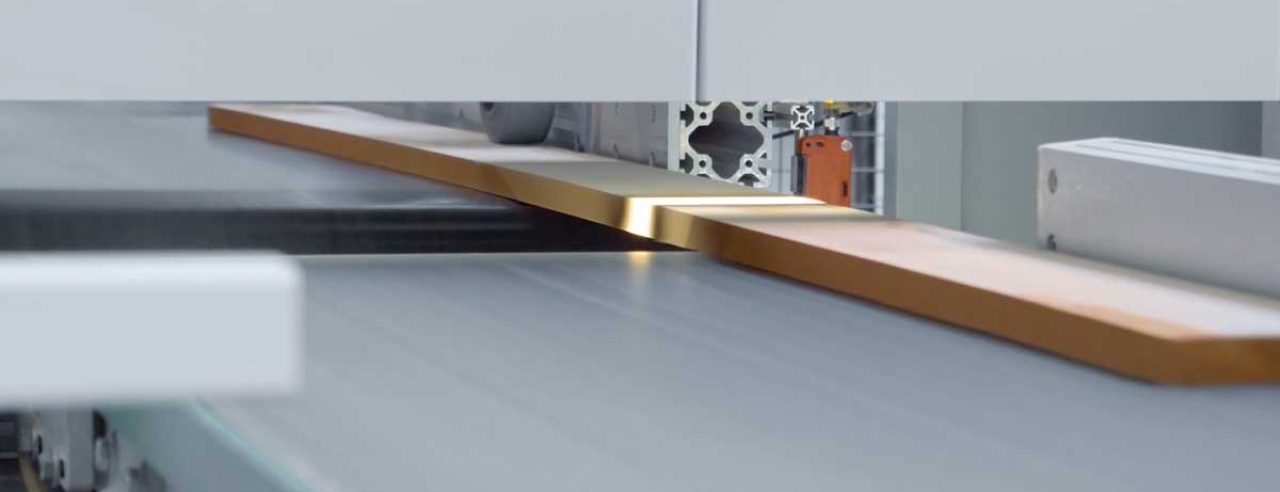Sawn Timber

Uniform colour, ideal moisture content 7-9%, pre-sanded, square-edged
Product quality you can see …
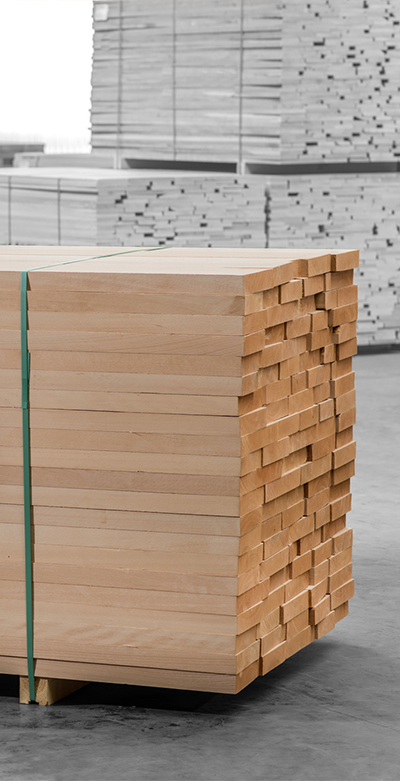
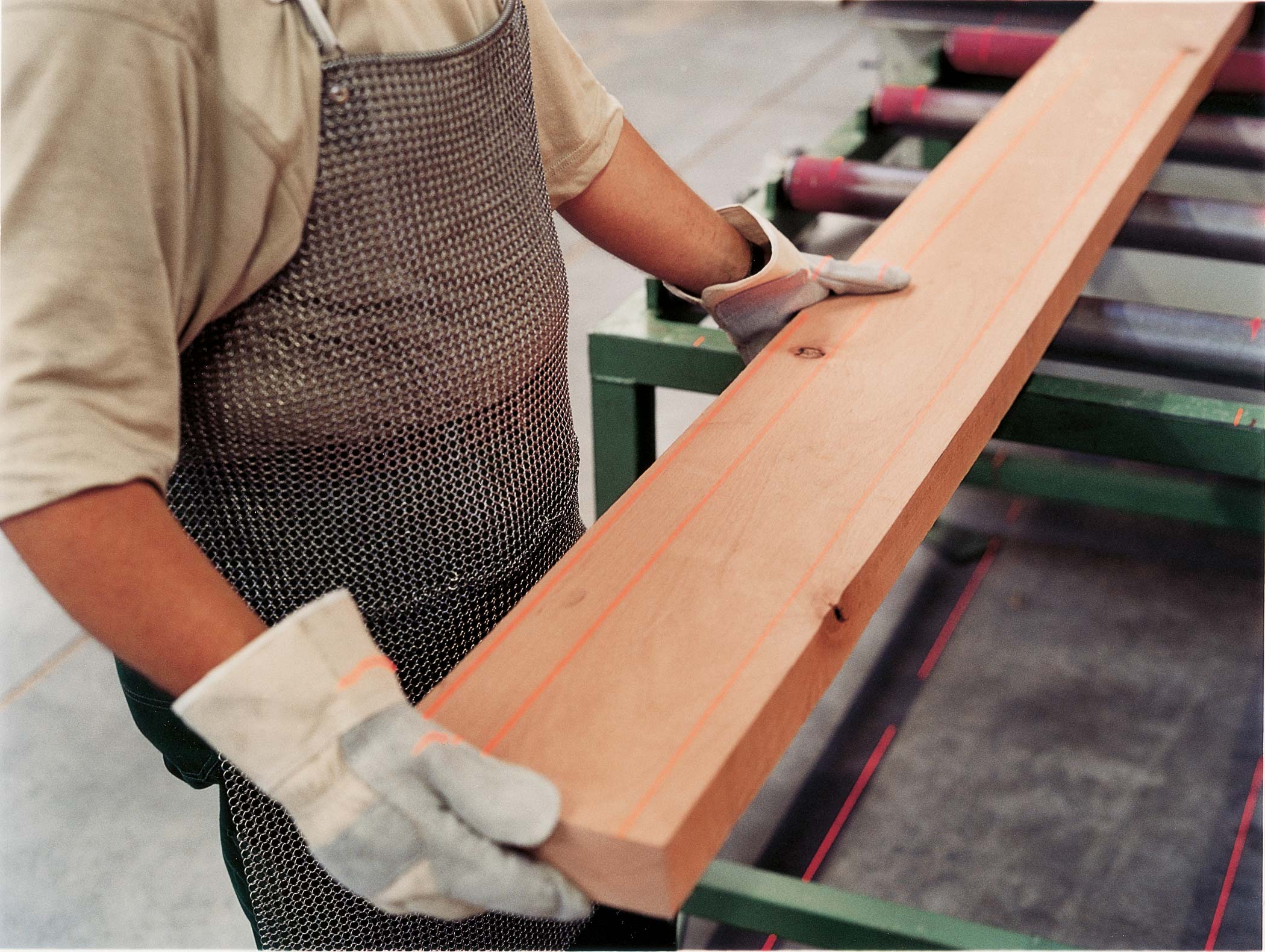
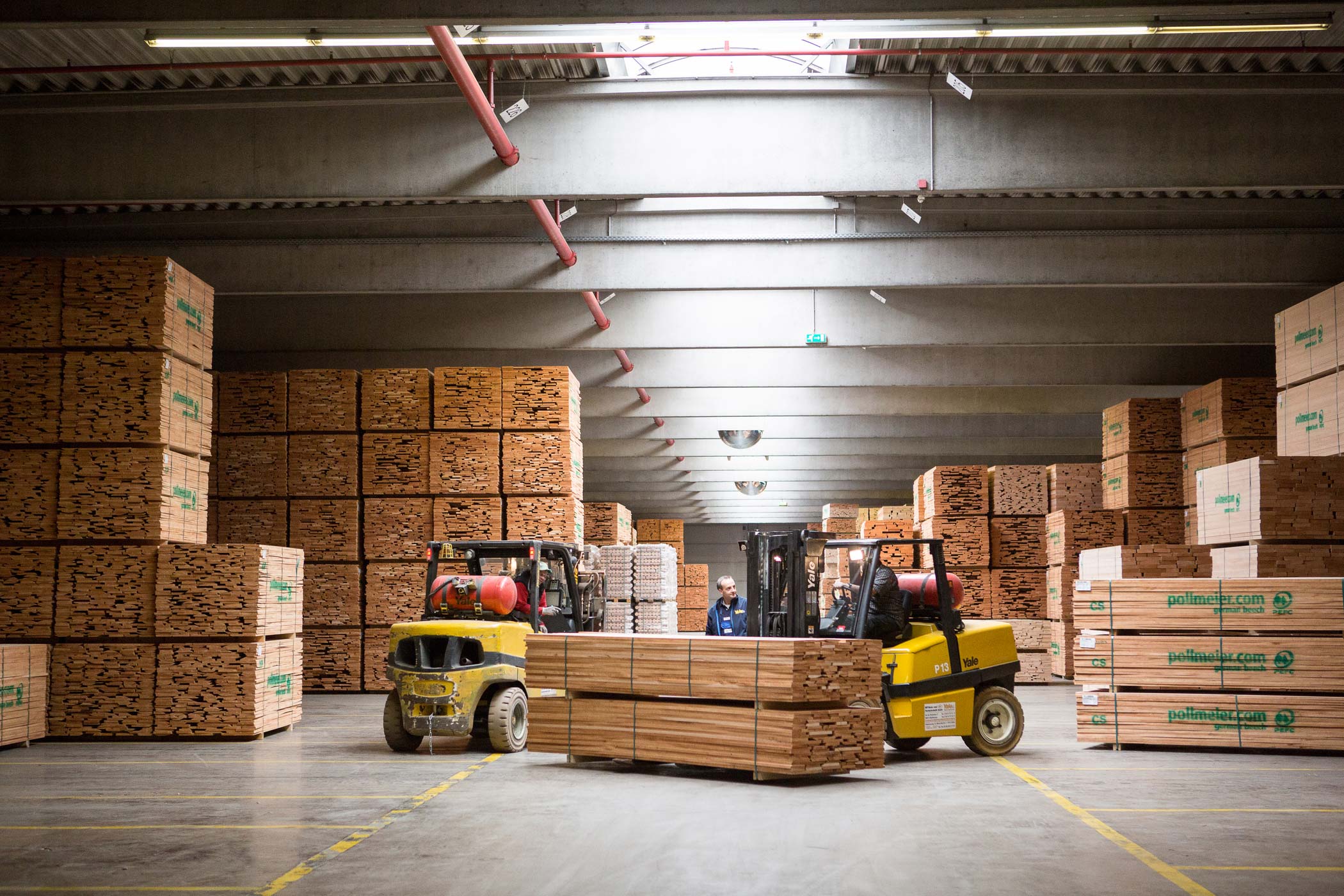
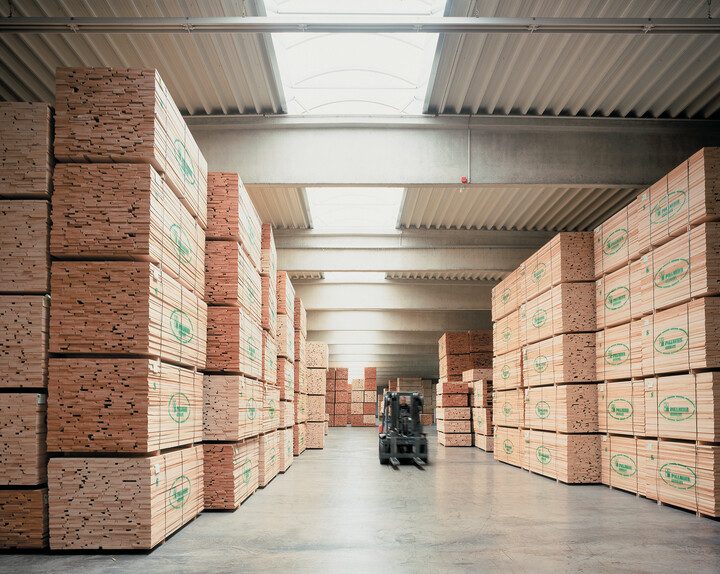
Pollmeier Beech stands for an extraordinary wood species and for timber of high quality at affordable prices. Give it a try yourself!
- Square-edged
- Lightly steamed, light uniform colour
- Precisely kiln-dried to 7 - 9% moisture content
- Conditioned
- Pre-sanded on both sides and quality-sorted based on strict criteria of the NHLA
- Ideal for staining
- Excellent surface quality thanks to the closed-pore wood structure
Pollmeier’s products come from sustainable forestry.
All timber is felled legally and is subject to state controls.
Our wood is PEFC certified.
Beech timber with high dimensional stability thanks to ideal moisture content.
The light-coloured wood is easy to machine. Its fine-grained and closed-pore structure gives it an excellent finish and allows the wood to take stain well. Beech is therefore the ideal hardwood for many end-products such as furniture, doors, stairs, kitchen cabinets, skirting boards, flooring, interior joinery and toys.
One wood – 1000 possibilities.
Which grade is best for me?
Our sales consultants are happy to advise you worldwide.
Our consultation service not only takes your end-products into account, but also your production processes. Together, we can identify the most suitable beech timber grade which offers you the best value for your money.
You will find overview of Pollmeier grades here.
Thicknesses
Invoiced thickness KD (pre-sanded thickness)
– 23 mm (20.0 mm)
– 26 mm (23.8 mm)
– 32 mm (29.5 mm)
– 38 mm (36.0 mm)
– 46 mm (43.0 mm)
– 52 mm (48.5 mm)
– 65 mm (63.0 mm)
– 78 mm (74.5 mm)
Size consistency approx. 0.3 mm
more thicknesses on request
Lengths
– 1.85 m
– 2.15 m
– 2.45 m
– 2.75 m
– 3.05 m
– 3.35 m
approx. 2-3 cm overlength
random width
7,5cm+ respectively 10cm+ depending on grading
Grade
Superior (more on request)
Lengths
2.45 m / 3.05 m / 3.35 m more lengths on request
thickness
26 mm / (23.8 mm)
32 mm / (29.5 mm)
38 mm / (36.0 mm)
52 mm / (48.5 mm)
Sorted to width
Width Range I
Width Range II
Width Range III
Width Range IV
Width Range V
Width Range VI
100-124mm
125-149mm
150-174mm
175-199mm
200-224mm
more than 200mm
Ripped-to-width
Widths from 40-220 mm
More beech timber grades and dimensions on request.
Choose beech timber with the best width group for your dimension requirements from 6 width ranges:
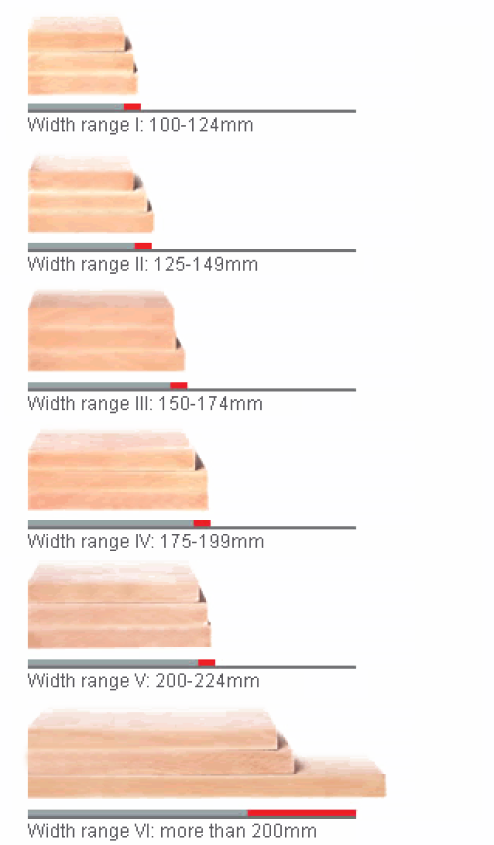
Thickness, lengths, widths
Thicknesses
Invoiced thickness KD (pre-sanded thickness)
– 23 mm (20.0 mm)
– 26 mm (23.8 mm)
– 32 mm (29.5 mm)
– 38 mm (36.0 mm)
– 46 mm (43.0 mm)
– 52 mm (48.5 mm)
– 65 mm (63.0 mm)
– 78 mm (74.5 mm)
Size consistency approx. 0.3 mm
Lengths
– 1.85 m
– 2.15 m
– 2.45 m
– 2.75 m
– 3.05 m
– 3.35 m
approx. 2-3 cm overlength
random width
10cm+, random width
Reduce scrap by using beech timber presorted/ripped to width
As a standard, Pollmeier beech timber is supplied in random width. In order to reduce your waste factor, you can obtain Pollmeier beech timber presorted to width or ripped to width. This saves cost of materials, transport and labour time.
Presorted/Ripped to width
Grade
Superior (more on request)
Lengths
2.45 m / 3.05 m / 3.35 m more lengths on request
thickness
26 mm / (23.8 mm)
32 mm / (29.5 mm)
38 mm / (36.0 mm)
52 mm / (48.5 mm)
Sorted to width
Width Range I
Width Range II
Width Range III
Width Range IV
Width Range V
Width Range VI
100-124mm
125-149mm
150-174mm
175-199mm
200-224mm
more than 200mm
Sorted to width
Widths from 40-220 mm in steps of 5 mm
More beech timber grades and dimensions on request.
Choose beech timber with the best width group for your dimension requirements from 6 width ranges:

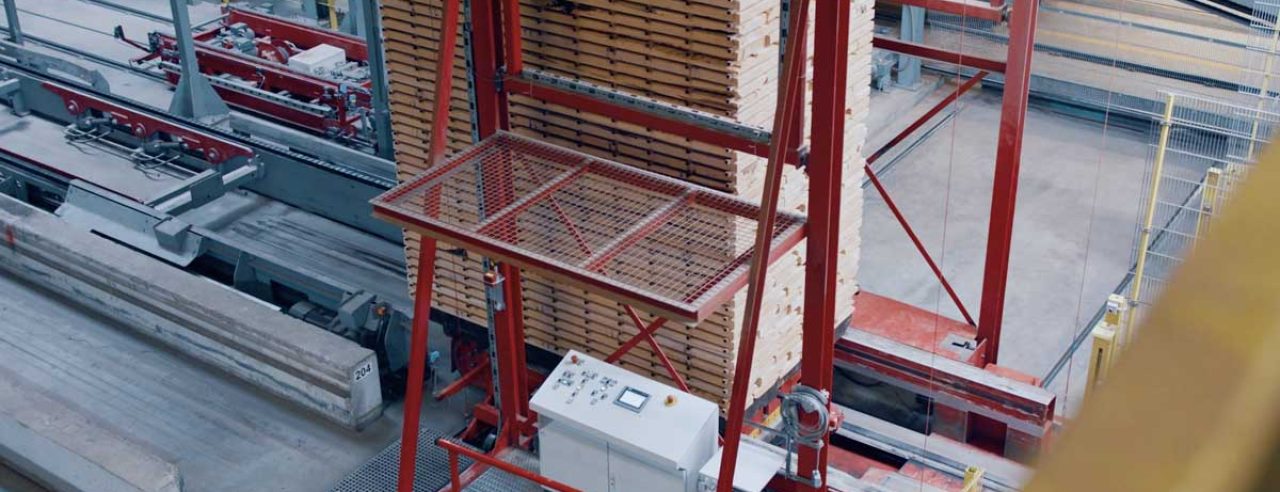
Contact sales
Want to know more about our products or do you have a question?
Faq
Your question isn't listed? We are happy to help you. Just contact us.
In our sawmills, only beech logs from German forests are used for the production of beech timber. More than 200 years ago, Germany started to implement sustainable forestry in its forests. Sustainability was defined along the terms, that only the same volume of trees was allowed to be taken out of the forests as was able to regrow. This was supposed to ensure the supply of the raw material wood for subsequent generations. Today, forest legislation is successfully safeguarding the sustainable usage of all forestal functions. Therefore, Germany is experiencing an increase in wood (volume) and forest (area), as more trees are growing as are used in a comparable period of time.
Please refer to question No. 2 for that matter.
Because of our modern cutting technique, we are able to also use logs of mediocre quality: selective cutting in the process allows for a high yield of good quality beech timber grades even from those boards, as opposed to conventionally sawn beech timber. Thereby, our log suppliers are more flexible in their forestry and we can keep the transport distances as low as possible.
We are certified according to the standard PEFC.
The PEFC certification scheme in favour of sustainable forestry (Programme for the Endorsement of Forest Certification Schemes) is based with regards to contents on international agreements, that have been approved by 37 nations within the Pan-European process during the Ministerial Conference on the Protection of Forests in Europe (Helsinki 1993, Lisbon 1998).
The primary goal of PEFC is the documentation and improvement of sustainable forestry in terms of economical, ecological and social standards.
More information under www.pefc.de or www.pefc.org.
The special technique of cutting tangentially around the core with a band saw is resulting in a higher percentage of boards with horizontal year rings. In order to still produce beech timber with very low inner tension and very high stability, we are using state-of-the-art kilning technology: more than 100 kilns are only filled with boards of the same thickness, that have been stacked automatically into very uniform bundles. Turbulences in the air-current are avoided, because only square-edged beech timber boards are in the chambers: the current of hot air can flow evenly through the individual layers of the wood stacks.
Another Pollmeier specialty is the over-drying with a subsequent conditioning process. This ensures that all the beech timber boards will eventually possess a homogeneous moisture content across the whole section of the board – the reason for the non-twisting stability of Pollmeier beech timber.
Many tradidional manufactures are afraid, that the beech timber will give way to tension in the final product due to the horizontal year rings. This principal disadvantage of unevenly dried wood is avoided at Pollmeier because of a painstakingly careful conditioning process.
Here we can reassure you in good conscience: our custom-made cylinder drum sander is a specialty in the Pollmeier chain of production. A downstream dust extraction unit successfully prevents sanding residues from remaining on the beech timber boards.
The easiest and best reference are satisfied customers: even processors using large volumes of Pollmeier beech timber, are not complaining about shorter life cycles of their tooling.
By the way, this fact has also been proven scientifically: an independent study done by the University of Hamburg clearly documents the absence of sanding residue on the beech boards.
Surely, you are aware of the problem: with traditionally sawn beech timber, hidden defects in the wood are often only discovered after planing. Then in effect, when you have already invested valuable working time, it is already too late. On the surface of wood with a rough saw cut, it is next to impossible to determine certain defects, such as for example steaming stains, water or mineral spots.
Pollmeier, however, is presanding the boards. This allows us to literally take a very close look into the sawn beech timber and to sort the boards precisely according to their quality. You are benefitting from presanding, because you can recognise wooden defects already before processing and are thus able to consider them. Not only does this save rejects and reclamations but also costs and time.
The KD-dimensions correspond to the standard thicknesses, which you are used to from your previous supplier. Please keep in mind however: conventionally sawn beech timber has to be planed before using it - the resulting chips are waste for the chip-container. The working step "planing" is unavoidable.
At Pollmeier, the beech timber boards are calibrated by means of presanding, in other words "industrially planed." We are taking care of this working step at considerably lower costs due to our fully automatic mass production. You can save valuable working time. What we are passing on to you, is only the material loss. The delivered net thickness of the boards, however, is precisely calibrated and can be put to full use.
To give you an example: in order to produce an edge-glued panel for stairsteps with a net thickness of 42mm, a staircase producer has to use conventional (unedged) beech timber with an invoiced thickness of up to 55mm. At Pollmeier, the invoiced thickness is indeed 52mm - the delivered 48,5mm thickness after presanding, however, can be fully used due to calibration. You can produce net thicknesses of up to 45 mm with it.
Presanding is furthermore the basic prerequisite for our precise quality-sorting:
by this defects in the wood and colour can be clearly determined.
In order to be more accurate and efficient, boards are not measured individually.
The volume of a bundle in cubic meters is calculated from the total weight. The conversion formula is taking the specific weight of beech timber at 7-9% moisture content into consideration.
In addition, the oversize length is deducted from the calculated volume by a special reduction factor. Thus, just to be on the safe side, you are always getting a little bit more wood than what is actually invoiced.
Pollmeier beech timber is available at wholesalers almost all over the world. It is possible to buy even small quantities fast and flexibly from stock: How to find your nearest Pollmeier-dealer. Starting from a certain order volume, direct deliveries are also possible. There are different minimum order volumes depending on the respective countries, where the shipment is supposed to go. Please contact our sales staff for more information.
Currently, we are mainly cutting beech timber only. To concentrate on one wood species, has turned us into market leader in a very short time period.
You are profiting from our comprehensive know-how, which we have acquired with this wood species over the years. At the moment, however, further wood species are being developed. But generally speaking, it is true, that the concentration on a few standardized products is the basis of an efficient industrial production: Quality wood at reasonable prices.

